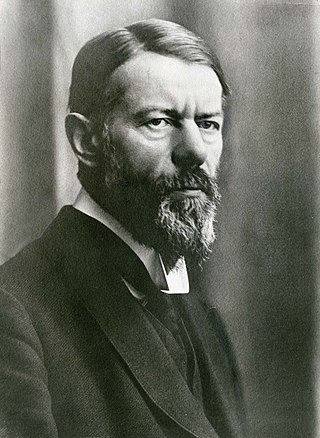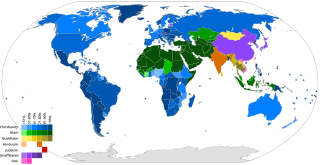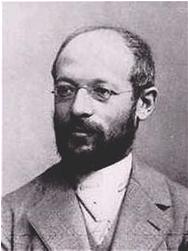
Maximilian Karl Emil Weber was a German sociologist, historian, jurist, and political economist who was one of the central figures in the development of sociology and the social sciences more generally. His ideas continue to influence social theory and research.

A sect is a subgroup of a religious, political, or philosophical belief system, usually an offshoot of a larger group. Although the term was originally a classification for religious separated groups, it can now refer to any organization that breaks away from a larger one to follow a different set of rules and principles. Sects are usually created due to perception of heresy by the subgroup and/or the larger group.

Talcott Parsons was an American sociologist of the classical tradition, best known for his social action theory and structural functionalism. Parsons is considered one of the most influential figures in sociology in the 20th century. After earning a PhD in economics, he served on the faculty at Harvard University from 1927 to 1973. In 1930, he was among the first professors in its new sociology department. Later, he was instrumental in the establishment of the Department of Social Relations at Harvard.

Georg Simmel was a German sociologist, philosopher, and critic.

Urban sociology is the sociological study of cities and urban life. One of the field’s oldest sub-disciplines, urban sociology studies and examines the social, historical, political, cultural, economic, and environmental forces that have shaped urban environments. Like most areas of sociology, urban sociologists use statistical analysis, observation, archival research, census data, social theory, interviews, and other methods to study a range of topics, including poverty, racial residential segregation, economic development, migration and demographic trends, gentrification, homelessness, blight and crime, urban decline, and neighborhood changes and revitalization. Urban sociological analysis provides critical insights that shape and guide urban planning and policy-making.

Ferdinand Tönnies was a German sociologist, economist, and philosopher. He was a significant contributor to sociological theory and field studies, best known for distinguishing between two types of social groups, Gemeinschaft and Gesellschaft. He co-founded the German Society for Sociology together with Max Weber and Georg Simmel and many other founders. He was president of the society from 1909 to 1933, after which he was ousted for having criticized the Nazis. Tönnies was regarded as the first proper German sociologist and published over 900 works, contributing to many areas of sociology and philosophy. Tönnies, Max Weber, and Georg Simmel are considered the founding fathers of classical German sociology. Though there has been a resurgence of interest in Weber and Simmel, Tönnies has not drawn as much attention.
Gemeinschaft and Gesellschaft, generally translated as "community and society", are categories which were used by the German sociologist Ferdinand Tönnies in order to categorize social relationships into two types. The Gesellschaft is associated with modern society and rational self-interest, which weakens the traditional bonds of family and local community that typify the Gemeinschaft. Max Weber, a founding figure in sociology, also wrote extensively about the relationship between Gemeinschaft and Gesellschaft. Weber wrote in direct response to Tönnies.

The Protestant Ethic and the Spirit of Capitalism is a book written by Max Weber, a German sociologist, economist, and politician. It began as a series of essays, the original German text was composed in 1904 and '05, and was translated into English for the first time by American sociologist Talcott Parsons in 1930. It is considered a founding text in economic sociology and a milestone contribution to sociological thought in general.

The German sociologist Max Weber formulated a three-component theory of stratification that defines a status group as a group of people within a society who can be differentiated by non-economic qualities such as honour, prestige, ethnicity, race, and religion. The German terms are Stand and Stände
Normal type is a typological term in sociology coined by the German sociologist Ferdinand Tönnies (1855–1936). It can be considered both as a forerunner of, and a challenge to, the rather better known concept of Max Weber’s: the ideal type.

The three-component theory of stratification, more widely known as Weberian stratification or the three class system, was developed by German sociologist Max Weber with class, status and party as distinct ideal types. Weber developed a multidimensional approach to social stratification that reflects the interplay among wealth, prestige and power.

This is a chronological list of works by Max Weber. Original titles with dates of publication and translated titles are given when possible, then a list of works translated into English, with earliest-found date of translation. The list of translations is most likely incomplete.
Verstehen, in the context of German philosophy and social sciences in general, has been used since the late 19th century – in English as in German – with the particular sense of the "interpretive or participatory" examination of social phenomena. The term is closely associated with the work of the German sociologist Max Weber, whose antipositivism established an alternative to prior sociological positivism and economic determinism, rooted in the analysis of social action. In anthropology, Verstehen has come to mean a systematic interpretive process in which an outside observer of a culture attempts to relate to it and understand others.

Sociology as a scholarly discipline emerged, primarily out of Enlightenment thought, as a positivist science of society shortly after the French Revolution. Its genesis owed to various key movements in the philosophy of science and the philosophy of knowledge, arising in reaction to such issues as modernity, capitalism, urbanization, rationalization, secularization, colonization and imperialism.

In social science, antipositivism is a theoretical stance which proposes that the social realm cannot be studied with the methods of investigation utilized within the natural sciences, and that investigation of the social realm requires a different epistemology. Fundamental to that antipositivist epistemology is the belief that the concepts and language researchers use in their research shape their perceptions of the social world they are investigating and seeking to define.
The following outline is provided as an overview of topics relating to community.

Economy and Society: An Outline of Interpretive Sociology is a book by political economist and sociologist Max Weber, published posthumously in Germany by his wife Marianne. Alongside The Protestant Ethic and the Spirit of Capitalism (1905), it is considered to be one of Weber's most important works. Extremely broad in scope, the book covers numerous themes including religion, economics, politics, public administration, and sociology. A complete translation of the work was not published in English until 1968.

The sociology of literature is a subfield of the sociology of culture. It studies the social production of literature and its social implications. A notable example is Pierre Bourdieu's 1992 Les Règles de L'Art: Genèse et Structure du Champ Littéraire, translated by Susan Emanuel as Rules of Art: Genesis and Structure of the Literary Field (1996).

The sociology of the Internet involves the application of sociological or social psychological theory and method to the Internet as a source of information and communication. The overlapping field of digital sociology focuses on understanding the use of digital media as part of everyday life, and how these various technologies contribute to patterns of human behavior, social relationships, and concepts of the self. Sociologists are concerned with the social implications of the technology; new social networks, virtual communities and ways of interaction that have arisen, as well as issues related to cyber crime.

Sociology is the scientific study of human society that focuses on society, human social behavior, patterns of social relationships, social interaction, and aspects of culture associated with everyday life. Regarded as a part of both the social sciences and humanities, sociology uses various methods of empirical investigation and critical analysis to develop a body of knowledge about social order and social change. Sociological subject matter ranges from micro-level analyses of individual interaction and agency to macro-level analyses of social systems and social structure. Applied sociological research may be applied directly to social policy and welfare, whereas theoretical approaches may focus on the understanding of social processes and phenomenological method.











